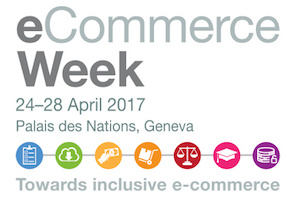Key outcomes and way forward
2 May 2017 02:00h
Event report
The closing session ‘Key Outcomes and Way Forward’ summarised the key points and concrete actions elaborated throughout the whole E-commerce Week. In particular, the chair of the Panel, Ms Shamika N Sirimanne, Director of the Division on Technology and Logistics (DTL), UNCTAD, affirmed the necessity for participants to value the outcomes of different working groups and make e-commerce more inclusive.
Mr Torbjorn Fredriksson, Head of the Information and Communication Technology (ICT) Analysis Section of the DTL, UNCTAD, formally opened the discussion by highlighting the importance of the event and its unprecedented success. Compared to the 2016 UNCTAD e-commerce week, this year’s participation rose from 300 people to about 900. Moreover, more than 90 countries were officially represented in the discussion as opposed to roughly 40 countries of previous year. Furthermore, important platforms and courses were launched during the week, such as the ‘e-trade4all’ online platform, the World Bank cybercrime toolkit, and the course on Digital Commerce offered by DiploFoundation.
Subsequently, Fredriksson invited eight speakers to report on the outcomes of the main sessions that took place during the week.
H.E. Ms Frances Lisson, Ambassador and Permanent Representative of Australia to the World Trade Organisation (WTO), reported from the session on gender and e-commerce. She underlined the wide gender gap that persist in terms of access to financial resources, participation and courses for women in the market. Consequently, she urged various international organisations to create a fertile ground, enabling and promoting women’s businesses. Moreover, she also stressed the importance of collaborating with the private sector and academia in order to have better disaggregated data.
Mr Jonathan Werner, Coordinator of the Enhanced Integrated Framework (EIF) Initiative, WTO, summarised the main outcomes of the session focusing on Least Developed Countries (LCDs). He reaffirmed that digital trade is the way forward but at the same time the digital divide remains tangible, especially in different areas of the world. He reminded the audience that the existing partnerships with the major stakeholders involved have brought positive results, such as the German presidency of G20. He pushed for an increase of resource mobilisation efforts and support to LDCs in mobilising resources regionally.
Mr Michael J Ferrantino, Lead Economist of the International Trade Department, World Bank, reported from the session on measurement. The conversation investigated the possibilities for improving the availability of data on e-commerce in developing countries. He highlighted three main conclusions: using the existing surveys in order to collect information on e-commerce, collaborate with the private and public sectors (such as postal data and the transport sector), and increase the capacity building.
Ms Teresa Moreira, Head of the Competition Policy and Consumer Protection Branch, UNCTAD, illustrated the main points of the discussion on the consumer protection in the online context. She underlined that an increase of e-commerce and mobile commerce would positively impact the application of the Sustainable Development Goals (SDGs) in developing countries. In particular, she urged participant to provide clearer information on rights and duties of consumers and to promote international co-operation aiming at developing consumer protection policies in the online context.
Mr Nick Ashton-Hart, Adviser, UNCTAD, illustrated the recommendations on the possible outcomes of payments. In particular, he stressed three important policy goals. Firstly, everyone everywhere should be able to consume any time, anywhere, through affordable payment methods. Secondly, there is the need to leverage flexibility, for example to promote credit card transactions without the need to request pre-authorisation from competent authorities. Thirdly, security and new payment forms should be assured through the development of multi-regulatory clearances.
Mr James Howe, Senior Adviser, ITC, reported from the session on Small and Medium-Sized Enterprises (SMEs). He explained that the discussion developed during this session was mainly business oriented, and focused on the use of e-commerce as a tool to increase connection with the external world. Moreover, he stressed the importance of e-commerce in fragile situations (e.g. in Syria) as a path towards stability and against isolation.
The reporting session was followed by an open discussion in which questions from the audience drew attention to three specific issues. First, the role of the private sector is crucial in increasing e-commerce in developing countries, hence it needs to be supported. Second, currently, a large part of e-commerce is domestic, thus the challenge for the future lies in increasing international, cross-border e-commerce. Third, potential risks of e-commerce in terms of security and child protection must not to be overlooked.
The week-long event was closed with remarks by Ms Mukhisa Kituyi, Secretary-General, UNCTAD. She thanked all the participants for their interest in the event and precious input during the discussions. She reminded the audience that although the UNCTAD E-commerce Week represents an important yearly meeting, important changes do not happen only once a year. Finally, she pushed the stakeholders involved not to be ‘Geneva centric’ but to consider the importance of the Asia Pacific Region and the challenges regarding cross-border transactions in Africa as well.
Related topics
Related event

